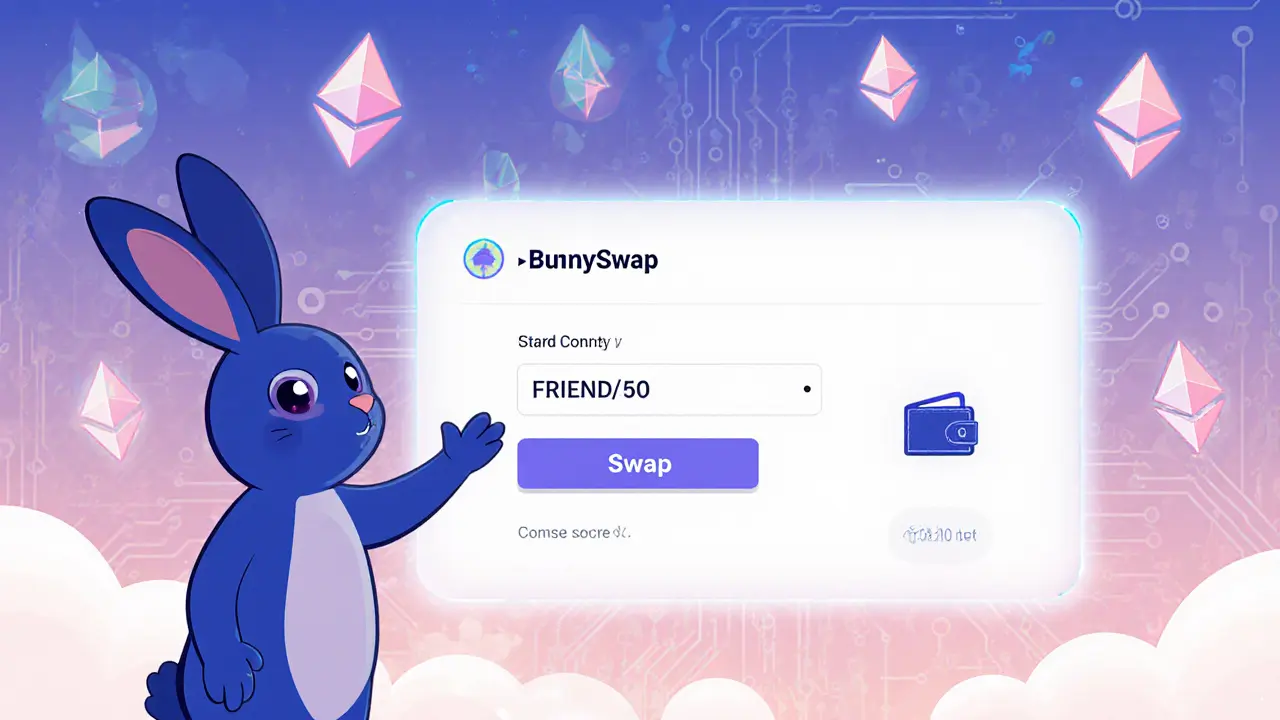
BunnySwap FRIEND/WETH Swap Calculator
Swap Result
FRIEND Token
Current Price: $0.00
24h Volume: $231.94
WETH Token
Current Price: $0.00
24h Volume: $0.00
When you hear the name BunnySwap is a decentralized exchange (DEX) that launched in 2024 to trade the Friend.tech token (FRIEND) against Wrapped Ethereum (WETH). It runs as an automated market maker (AMM) on the Ethereum blockchain, meaning trades happen through smart contracts instead of a traditional order book. In this BunnySwap review we’ll break down how the platform works, what the numbers look like, how it stacks up against bigger players, and whether it’s worth a look for anyone chasing FRIEND.
Key Takeaways
- BunnySwap offers a single trading pair (FRIEND/WETH) with a 0.603% average spread.
- 24‑hour volume sits at $231.94, down 92.91% from the previous day, placing it in the low‑percentile tier of DEX activity.
- Liquidity depth is shallow - a $11,652 price on the +2% side and $11,617 on the -2% side - so larger swaps can cause noticeable slippage.
- No fiat on‑ramps, cross‑chain bridges, or advanced order types; you need an Ethereum wallet and some ETH for gas.
- Security relies on standard DeFi non‑custodial practices, but the platform lacks third‑party audit reports.
What Is BunnySwap?
BunnySwap is a decentralized cryptocurrency exchange built on the Ethereum network. Its sole purpose is to let users swap the Friend.tech protocol token (FRIEND) for Wrapped Ethereum (WETH) and vice‑versa. The platform mimics the Uniswap interface, using a constant product AMM formula (x·y = k) to price trades. Because there’s only one pair, the UI feels minimal - you connect a wallet, approve the token, and hit “Swap”.
How the AMM Model Works on BunnySwap
Behind the scenes, Automated Market Maker (AMM) contracts hold a pool of FRIEND and WETH. When you trade, the contract adjusts the ratio, automatically determining the price. Liquidity providers (LPs) deposit equal values of both assets and earn a share of the 0.3% swap fee. Since BunnySwap only supports one pair, the pool is tiny, which explains the shallow order‑book depth numbers reported by CoinGecko.
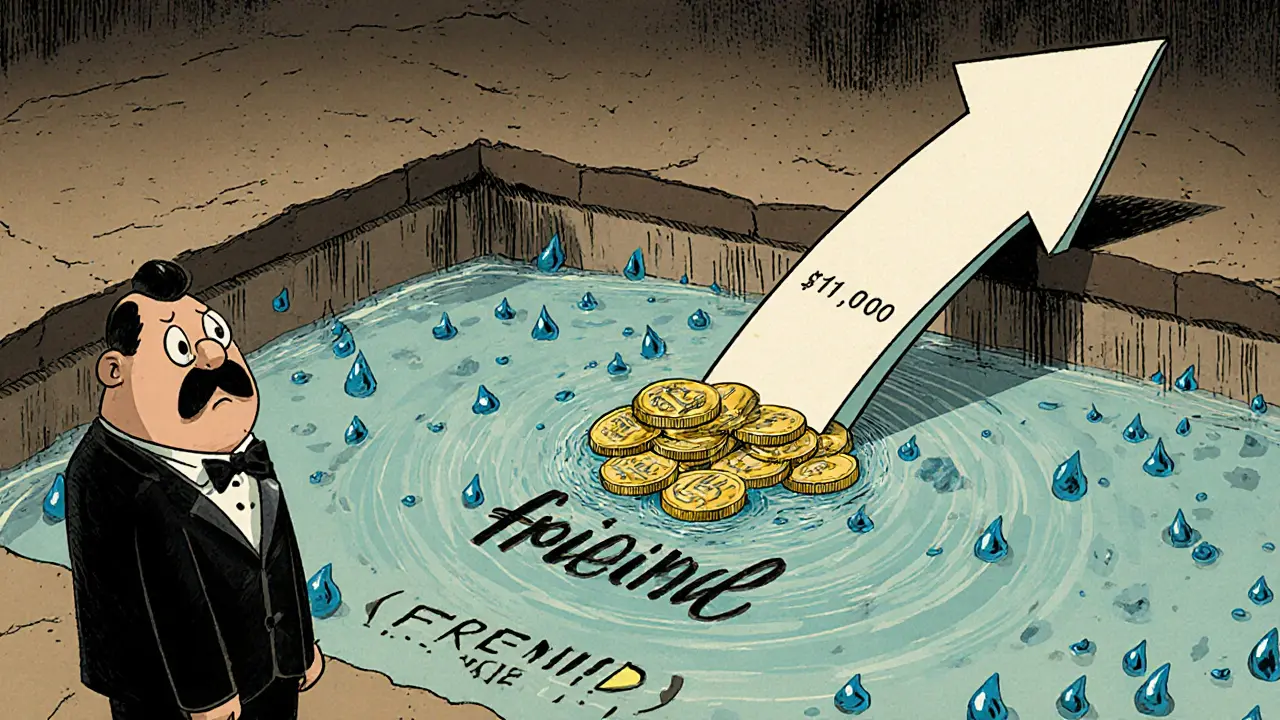
Current Metrics (as of October102025)
- 24‑hour trading volume: $231.94
- Volume change: -92.91% vs. previous day
- Average bid‑ask spread: 0.603%
- Depth +2%: $11,652
- Depth -2%: $11,617
- Volume percentile: 26th
- Depth percentile: 45th
These figures indicate a niche market with very limited activity. For comparison, the leading DEX Uniswap moved over $1.24billion in the same 24‑hour window.
How BunnySwap Stacks Up Against Major DEXs
| Feature | BunnySwap | Uniswap | PancakeSwap | SushiSwap |
|---|---|---|---|---|
| Trading pairs | 1 (FRIEND/WETH) | 1,832+ | 1,203 (on BSC) | 715+ |
| 24‑hr volume (USD) | $231.94 | $1.24B | $487M | $94M |
| Average spread | 0.603% | ~0.2% (varies) | ~0.3% (varies) | ~0.4% (varies) |
| Liquidity depth (USD)* | ≈ $11,600 | > $100M | > $50M | > $30M |
| Cross‑chain swaps | No | No (Ethereum‑only) | Yes (BSC, Polygon) | Yes (multiple chains) |
| Fiat on‑ramp | No | No | Limited (via partners) | Limited |
*Depth shown at +2% / -2% price levels.
Pros and Cons
Pros
- Very narrow focus on FRIEND means the token is always listed and instantly tradable.
- Simple UI - even newcomers can locate the swap button within seconds.
- Low swap fee (standard 0.3%) that goes straight to LPs.
Cons
- Only one pair - no way to hedge or diversify within the platform.
- Shallow liquidity leads to slippage on trades larger than a few hundred dollars.
- Absence of audit reports raises questions about contract safety.
- No customer support channels; users rely on community Discord or Telegram, which have unverified activity.
- Heavy reliance on Ethereum gas; spikes can make tiny trades uneconomical.

Security and Risks
Because BunnySwap is non‑custodial, your funds stay in your own wallet until you approve a transaction. This eliminates exchange‑level hacks but introduces two main risks:
- Smart‑contract bugs: No third‑party audit has been published, so a hidden vulnerability could be exploited.
- Liquidity‑miner attacks: With a tiny pool, a malicious actor could front‑run large swaps, draining value before honest users complete their trades.
Mitigation strategies include: only swapping amounts you can afford to lose, setting tight slippage limits (e.g., 0.5%), and monitoring the pool size before executing.
User Experience: What You Need to Get Started
To use BunnySwap you’ll need:
- An Ethereum‑compatible wallet (MetaMask, Trust Wallet, etc.).
- Some ETH to cover gas fees.
- FRIEND tokens or WETH to trade.
Steps:
- Open the BunnySwap website and click “Connect Wallet”.
- Approve the FRIEND token for spending (Ethereum will prompt a transaction).
- Enter the amount of FRIEND or WETH you want to swap and confirm.
- Set a slippage tolerance - 0.5% is a safe starting point given the pool size.
- Confirm the swap; wait for the transaction receipt.
The flow mirrors Uniswap, so users familiar with other AMMs will feel at home. However, the lack of tutorial videos or detailed help docs makes it harder for absolute beginners.
Future Outlook
The platform’s survival hinges on the growth of the Friend.tech ecosystem. If the social‑token model gains mainstream traction, demand for a dedicated FRIEND market could push BunnySwap’s volume back up. Conversely, if larger DEXs continue to add FRIEND listings (Uniswap already shows $1.2M daily FRIEND volume), the niche advantage evaporates.
There is currently no public roadmap, no upcoming feature announcements, and no known partnerships. The -92.91% volume drop suggests that user interest is waning, which could lead to the pool drying up entirely if liquidity providers pull out.
Investors and traders should treat BunnySwap as a speculative, single‑token playground rather than a long‑term gateway to the broader DeFi universe.
Frequently Asked Questions
Is BunnySwap a centralized exchange?
No. BunnySwap is a decentralized exchange (DEX) that runs entirely on smart contracts on the Ethereum blockchain. Users keep custody of their tokens at all times.
Can I trade other tokens on BunnySwap?
Currently the platform only supports the FRIEND/WETH pair. There are no other trading pairs available.
What fees does BunnySwap charge?
The swap fee is the standard 0.3% taken from each trade and distributed to liquidity providers.
Is the smart‑contract code audited?
Public sources do not list any third‑party audit for BunnySwap’s contracts, so users should assume the code has not been independently verified.
How do I add liquidity to the FRIEND/WETH pool?
After connecting your wallet, click “Add Liquidity”, approve both FRIEND and WETH, specify equal USD values of each token, and confirm the transaction. You’ll receive LP tokens representing your share.
In short, BunnySwap offers a laser‑focused trading lane for the Friend.tech token but suffers from tiny volume, shallow liquidity, and a lack of safety audits. If you’re only looking to swap FRIEND quickly and already have an Ethereum wallet, it can serve that purpose. For broader trading, better liquidity, or lower risk, established DEXs like Uniswap or PancakeSwap remain the smarter choice.

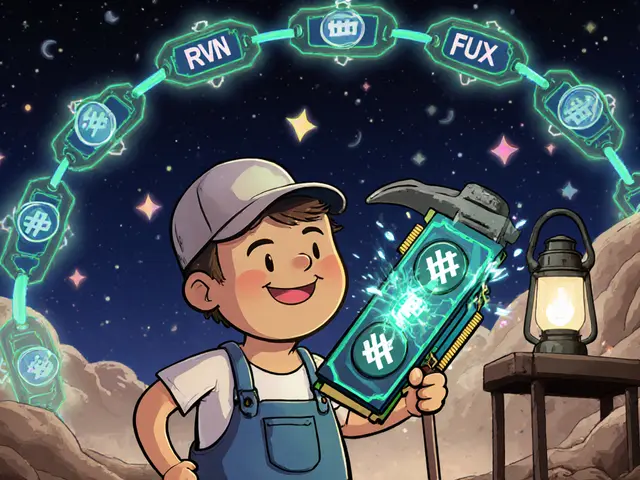
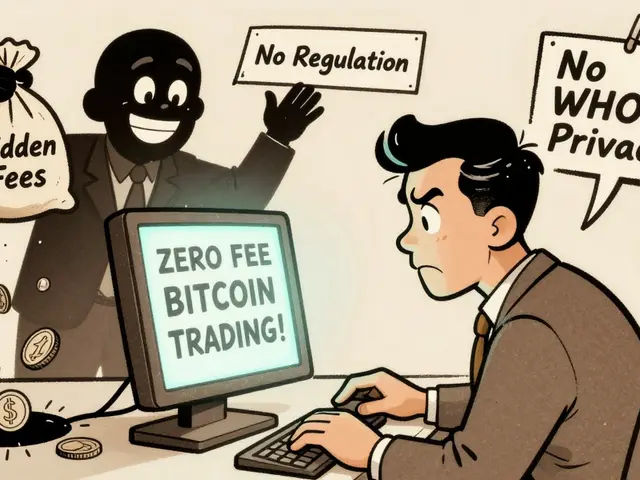

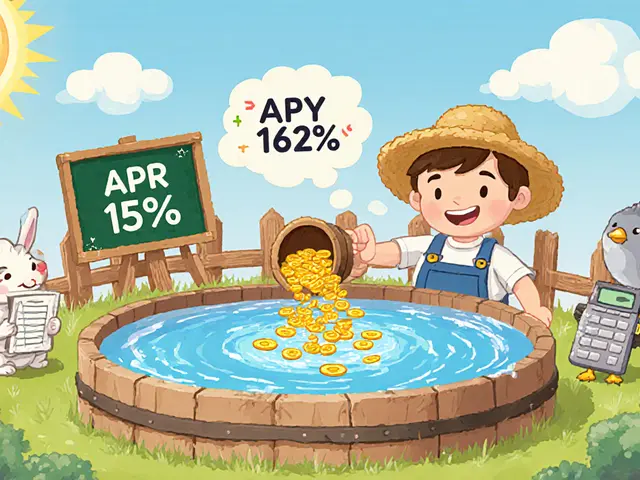
Comments (8)
Ayanda Ndoni
bro this is a ghost town. i checked it last week and the slippage was already wild, now it’s like trading in an empty room with a guy who’s half-asleep. why even bother?
Patrick De Leon
Let me be blunt. This isn’t a DEX. It’s a liquidity graveyard. Zero audits, one token pair, volume lower than my dog’s daily treat budget. If you’re not a degenerate chasing a meme coin with no future, you’re wasting your time and your ETH.
Ali Korkor
hey if you’re just trying to flip FRIEND quick and you already got eth for gas, this thing works. simple, no fluff. just swap and go. don’t overthink it. lots of new people are jumping in and it’s actually kinda cool to see a niche tool do its thing.
Serena Dean
Don’t sleep on the simplicity! If you’re not trying to trade 10k worth of FRIEND, this is actually the smoothest experience out there. No clutter, no confusing menus. Just connect, approve, swap. I’ve used Uniswap for years and this is way less stressful for small trades. Just set your slippage to 0.5% and you’ll be fine.
Michael Folorunsho
Let’s be real - this platform is a joke. A single trading pair? In 2025? On Ethereum? With no audit? You’re telling me a team built this and thought ‘nah, we don’t need a security review’? That’s not innovation, that’s negligence. And the volume drop? That’s the market screaming. This isn’t a DEX, it’s a tombstone for lazy developers who thought ‘FRIEND is gonna blow up’ and called it a day.
Meanwhile, Uniswap is listing 50 new tokens a week and still moving billions. This isn’t competition. This is a sideshow at a carnival that’s about to close down. If you’re holding FRIEND, good for you - but don’t waste your time here. Use the real exchange. Or better yet, just hodl.
And the fact that people still call this ‘user-friendly’? That’s the real tragedy. It’s not friendly - it’s abandoned. And you’re the sucker holding the bag.
Sean Huang
you think this is just a bad dex? think again. the entire friend.tech ecosystem is a fed puppet show. they seeded this liquidity with insider wallets, then let it die to trap retail. look at the volume drop - 92% in a day? that’s not market action, that’s a controlled demolition. they’re draining the pool to buy back at pennies. the audit? never coming. the devs? already cashed out. this is a honeypot with a cute bunny logo. don’t touch it. ever.
Norman Woo
idk man i tried it and it worked fine for me. swapped 0.5 FRIEND and it took like 10 sec. no issues. maybe the volume is low but if you just wanna get in and out quick its fine. also why do people care so much about audits? every degen project is unaudited until someone gets hacked. then its like oh nooo but we all knew that already
madhu belavadi
if you’re still trading on this thing you’re already too deep. i saw the same pattern with the last 3 meme dexes. first the hype, then the slow bleed, then the devs ghost. this isn’t a platform - it’s a countdown clock. you’re not investing, you’re just waiting for the rug to be pulled. go play with real money.